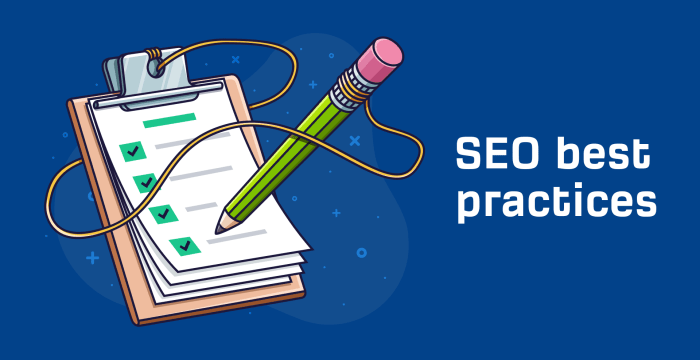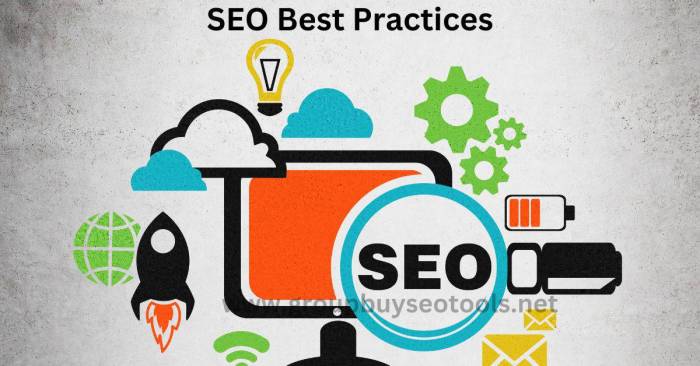SEO Best Practices – Best Practices sets the stage for this enthralling narrative, offering readers a glimpse into a story that is rich in detail with american high school hip style and brimming with originality from the outset.
best practices are like the cool kids in school – they know how to get noticed and make a lasting impression. Let’s dive into the world of and discover the secrets to boosting your website’s visibility and user experience.
Importance of Best Practices: SEO Best Practices

In the world of websites and online presence, sticking to best practices is like rockin’ the latest kicks – it’s essential for making sure your site stands out from the crowd and gets the attention it deserves. Let’s break it down, shall we?
best practices ain’t just about sprinkling some s here and there – it’s about optimizing your site in a way that search engines like Google can’t help but notice. When you follow these best practices, you’re basically telling search engines, “Hey, check me out, I’m legit!” This helps boost your site’s visibility and makes it easier for folks to find you when they’re searching for something related to your content.
Now, let’s talk about search engine rankings. Picture this – you’re in a rap battle and you wanna make sure you come out on top. That’s where best practices come in. By following these guidelines, you’re increasing your chances of ranking higher in search engine results pages (SERPs). The higher you rank, the more likely peeps are gonna click on your site and check out what you have to offer. It’s like being center stage at the school talent show – everyone’s eyes are on you!
But wait, there’s more! best practices don’t just benefit search engines, they also make the user experience smooth like butter. By optimizing your site with relevant s, quality content, and easy navigation, you’re making it a breeze for visitors to find what they’re looking for. Think of it as throwing the dopest party in town – everyone’s having a great time and they don’t wanna leave!
So remember, when it comes to best practices, it’s all about making sure your site shines bright like a diamond in the online world. Stick to these guidelines, and you’ll be on your way to becoming the coolest kid on the digital block. Word.
On-Page Best Practices

When it comes to on-page , there are several best practices that can help optimize your website for search engines. By focusing on elements like meta tags, headings, and content, as well as internal linking, you can improve your site’s visibility and ranking on search engine results pages.
Optimizing Meta Tags, Headings, and Content:
Meta Tags, SEO Best Practices
Meta tags play a crucial role in informing search engines about the content of your web pages. By including relevant s in your title tags, meta descriptions, and alt text for images, you can improve your site’s chances of appearing in search results.
Headings
Headings, such as H1, H2, and H3 tags, help organize and structure your content for both users and search engines. By including s in your headings, you can signal to search engines what your content is about and improve your chances of ranking for those terms.
Content
High-quality, relevant content is key to on-page success. By creating unique and informative content that incorporates targeted s naturally, you can attract both users and search engines to your site. Regularly updating and expanding your content can also help improve your site’s visibility and authority.
Significance of Internal Linking:
Internal linking involves linking from one page on your website to another. By strategically linking to relevant pages within your site, you can improve navigation for users and help search engines understand the structure and hierarchy of your content. Internal linking also helps distribute link equity throughout your site, boosting the authority of important pages and improving overall performance.
Off-Page Best Practices
When it comes to off-page , we’re talking about all the activities that take place outside of your website to improve its search engine rankings. This includes building high-quality backlinks and utilizing social media to boost your online presence.
Building High-Quality Backlinks
Building backlinks is crucial for off-page as search engines like Google consider them as a vote of confidence for your website. Here are some strategies to help you build high-quality backlinks:
- Guest Posting: Writing quality content for other websites in your niche can help you earn backlinks.
- Broken Link Building: Find broken links on other websites and offer your content as a replacement.
- Skyscraper Technique: Create content better than what’s already out there to attract backlinks naturally.
Social Media’s Role in
Social media plays a significant role in off-page by allowing you to reach a wider audience and drive traffic back to your website. Here’s how you can leverage social media for :
- Share Your Content: Post your blogs, articles, and updates on social media platforms to attract more visitors.
- Engage with Your Audience: Respond to comments, messages, and interact with your followers to build relationships and credibility.
- Collaborate with Influencers: Partnering with influencers in your industry can help you reach a broader audience and gain more backlinks.
Technical Best Practices
When it comes to boosting your website’s performance and visibility on search engines, technical plays a crucial role. By focusing on the technical aspects of your site, you can ensure that it is optimized for search engine crawlers and provides a seamless experience for users.
Significance of Technical
- Optimizing your website’s technical elements, such as site structure, meta tags, and XML sitemaps, can help search engines better understand and index your content.
- Fixing technical issues like broken links, duplicate content, and slow loading times can improve your site’s overall health and performance.
- Technical ensures that your website meets search engine guidelines and standards, increasing the chances of ranking higher in search results.
Website Speed Optimization
- Having a fast-loading website is crucial for user experience and rankings, as slow loading times can lead to higher bounce rates and lower search visibility.
- Optimizing images, minifying CSS and JavaScript files, and leveraging browser caching are some strategies to improve website speed.
- Google considers page speed as a ranking factor, so optimizing your site’s speed can positively impact your search engine rankings.
Role of Structured Data
- Implementing structured data markup on your website can provide search engines with additional context about your content, leading to enhanced search engine visibility through rich snippets and featured snippets.
- Structured data helps search engines understand the meaning behind your content, making it easier for them to display relevant information to users in search results.
- By incorporating structured data, you can increase the likelihood of your website appearing in rich results, which can improve click-through rates and drive more organic traffic to your site.





